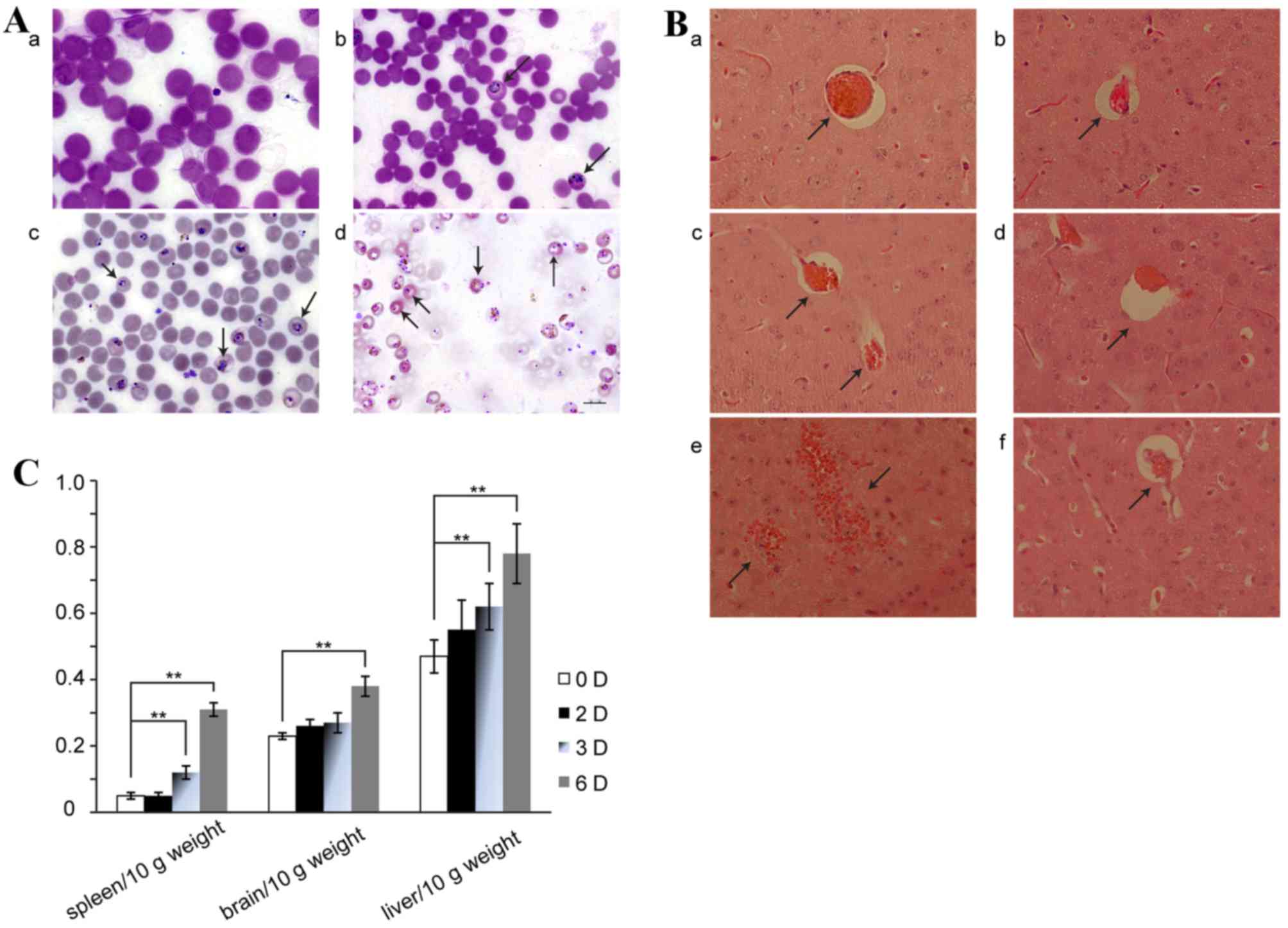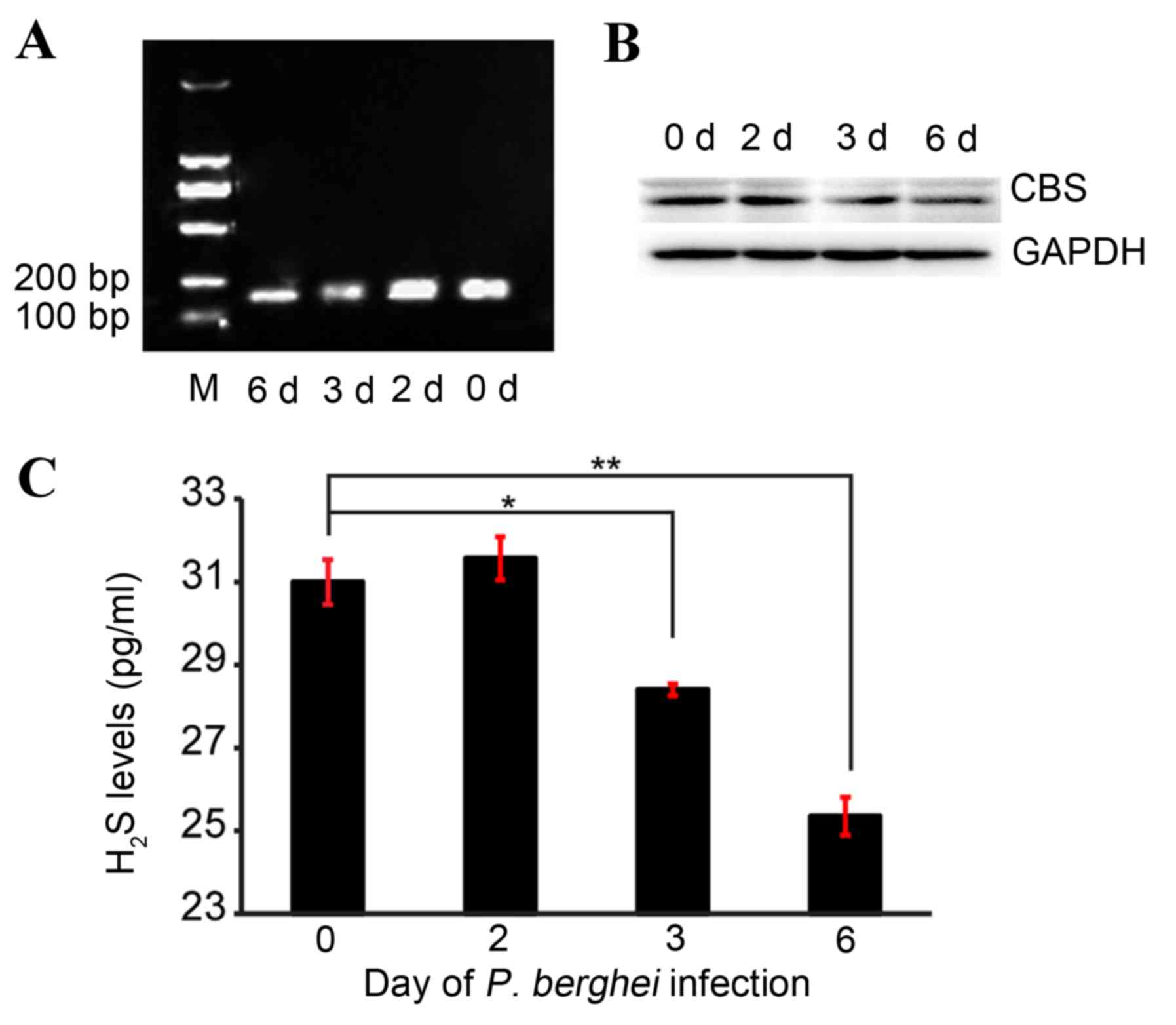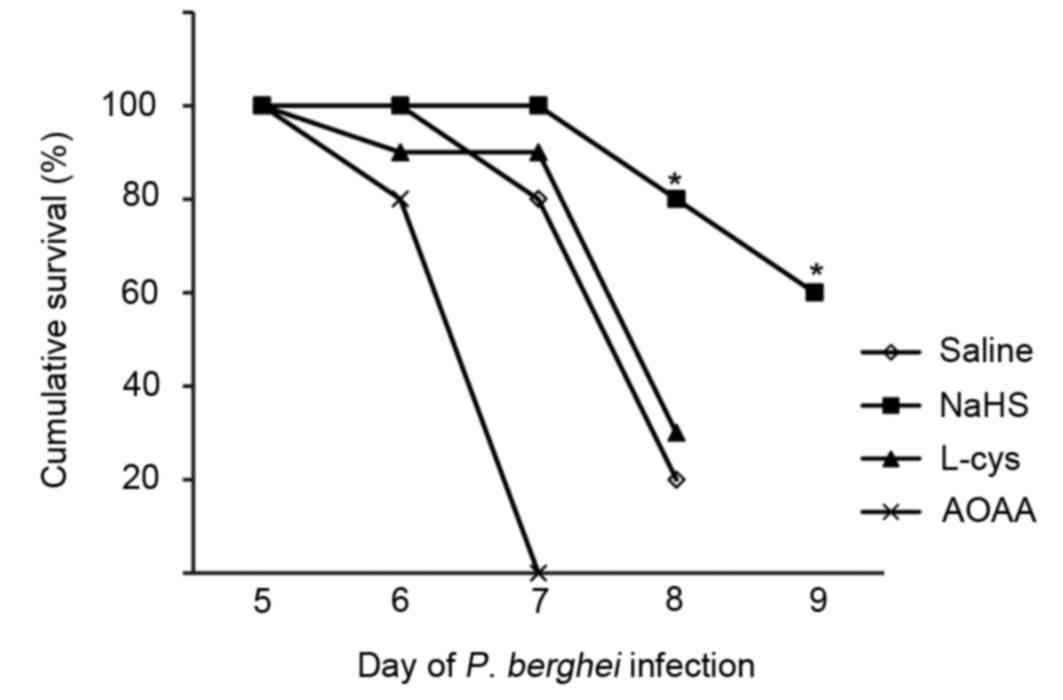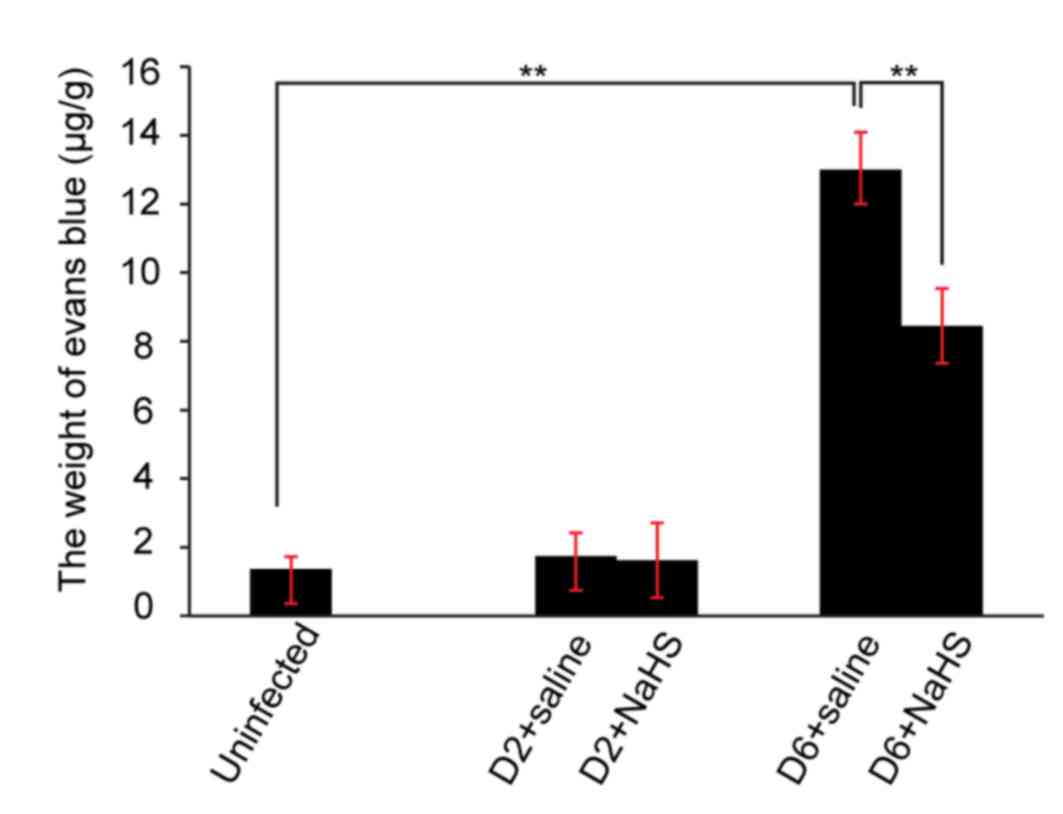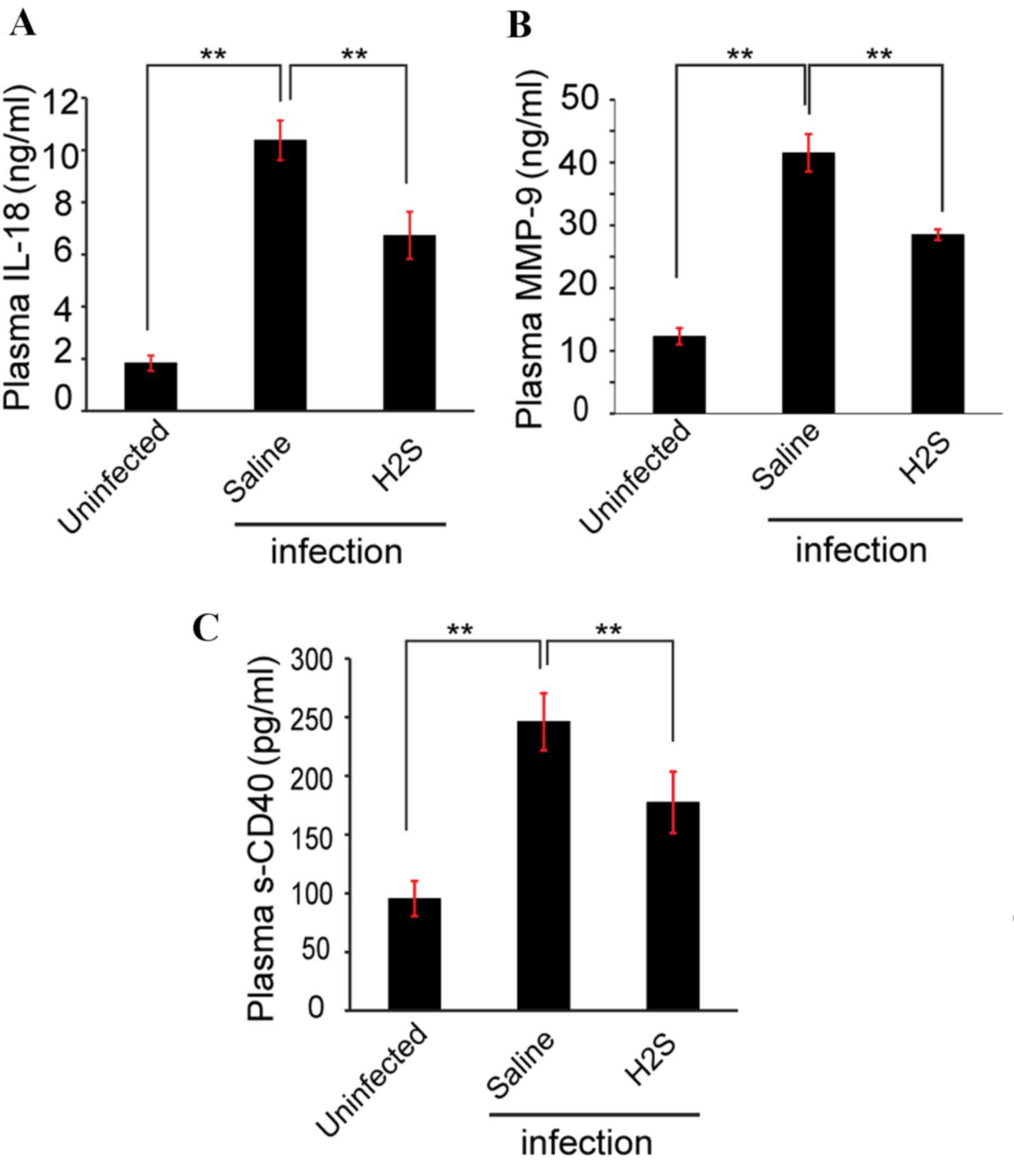|
1
|
Mung'Ala-Odera V, Snow RW and Newton CR:
The burden of the neurocognitive impairment associated with
Plasmodium falciparum malaria in sub-saharan Africa. Am J Trop Med
Hyg. 71 2 Suppl:S64–S70. 2004.
|
|
2
|
Van Hensbroek MB, Palmer A, Jaffar S,
Schneider G and Kwiatkowski D: Residual neurologic sequelae after
childhood cerebral malaria. J Pediatr. 131:125–129. 1997.
View Article : Google Scholar : PubMed/NCBI
|
|
3
|
Wallace JL, Blackler RW, Chan MV, Da Silva
GJ, Elsheikh W, Flannigan KL, Gamaniek I, Manko A, Wang L, Motta JP
and Buret AG: Anti-inflammatory and cytoprotective actions of
hydrogen sulfide: Translation to therapeutics. Antioxid Redox
Signal. 22:398–410. 2015. View Article : Google Scholar : PubMed/NCBI
|
|
4
|
Wallace JL, Caliendo G, Santagada V,
Cirino G and Fiorucci S: Gastrointestinal safety and
anti-inflammatory effects of a hydrogen sulfide-releasing
diclofenac derivative in the rat. Gastroenterology. 132:261–271.
2007. View Article : Google Scholar : PubMed/NCBI
|
|
5
|
Yang C, Yang Z, Zhang M, Dong Q, Wang X,
Lan A, Zeng F, Chen P, Wang C and Feng J: Hydrogen sulfide protects
against chemical hypoxia-induced cytotoxicity and inflammation in
HaCaT cells through inhibition of ROS/NF-κB/COX-2 pathway. PLoS
One. 6:e219712011. View Article : Google Scholar : PubMed/NCBI
|
|
6
|
Li L, Rossoni G, Sparatore A, Lee LC, Del
Soldato P and Moore PK: Anti-inflammatory and gastrointestinal
effects of a novel diclofenac derivative. Free Radic Biol Med.
42:706–719. 2007. View Article : Google Scholar : PubMed/NCBI
|
|
7
|
Wallace JL: Hydrogen sulfide-releasing
anti-inflammatory drugs. Trends Pharmacol Sci. 28:501–505. 2007.
View Article : Google Scholar : PubMed/NCBI
|
|
8
|
Zanardo RC, Brancaleone V, Distrutti E,
Fiorucci S, Cirino G and Wallace JL: Hydrogen sulfide is an
endogenous modulator of leukocyte-mediated inflammation. FASEB J.
20:2118–2120. 2006. View Article : Google Scholar : PubMed/NCBI
|
|
9
|
Kimura H: Hydrogen sulfide induces cyclic
AMP and modulates the NMDA receptor. Biochem Biophys Res Commun.
267:129–133. 2000. View Article : Google Scholar : PubMed/NCBI
|
|
10
|
Kimura H: Hydrogen sulfide as a
neuromodulator. Mol Neurobiol. 26:13–19. 2002. View Article : Google Scholar : PubMed/NCBI
|
|
11
|
Whiteman M, Cheung NS, Zhu YZ, Chu SH,
Siau JL, Wong BS, Armstrong JS and Moore PK: Hydrogen sulphide: A
novel inhibitor of hypochlorous acid-mediated oxidative damage in
the brain? Biochem Biophys Res Commun. 326:794–798. 2005.
View Article : Google Scholar : PubMed/NCBI
|
|
12
|
Whiteman M, Li L, Rose P, Tan CH,
Parkinson DB and Moore PK: The effect of hydrogen sulfide donors on
lipopolysaccharide-induced formation of inflammatory mediators in
macrophages. Antioxid Redox Signal. 12:1147–1154. 2010. View Article : Google Scholar : PubMed/NCBI
|
|
13
|
de Oca MM, Engwerda C and Haque A:
Plasmodium berghei ANKA (PbA) infection of C57BL/6J mice: A model
of severe malaria. Methods Mol Biol. 1031:203–213. 2013. View Article : Google Scholar : PubMed/NCBI
|
|
14
|
Carroll RW, Wainwright MS, Kim KY, Kidambi
T, Gómez ND, Taylor T and Haldar K: A rapid murine coma and
behavior scale for quantitative assessment of murine cerebral
malaria. PLoS One. 5:pii: e131242010. View Article : Google Scholar
|
|
15
|
Baccarella A, Huang BW, Fontana MF and Kim
CC: Loss of Toll-like receptor 7 alters cytokine production and
protects against experimental cerebral malaria. Malar J.
13:3542014. View Article : Google Scholar : PubMed/NCBI
|
|
16
|
Chang WL, Jones SP, Lefer DJ, Welbourne T,
Sun G, Yin L, Suzuki H, Huang J, Granger DN and van der Heyde HC:
CD8(+)-T-cell depletion ameliorates circulatory shock in Plasmodium
berghei-infected mice. Infect Immun. 69:7341–7348. 2001. View Article : Google Scholar : PubMed/NCBI
|
|
17
|
DellaValle B, Staalsoe T, Kurtzhals JA and
Hempel C: Investigation of hydrogen sulfide gas as a treatment
against P. falciparum, murine cerebral malaria, and the importance
of thiolation state in the development of cerebral malaria. PLoS
One. 8:e592712013. View Article : Google Scholar : PubMed/NCBI
|
|
18
|
Goodwin LR, Francom D, Dieken FP, Taylor
JD, Warenycia MW, Reiffenstein RJ and Dowling G: Determination of
sulfide in brain tissue by gas dialysis/ion chromatography:
Postmortem studies and two case reports. J Anal Toxicol.
13:105–109. 1989. View Article : Google Scholar : PubMed/NCBI
|
|
19
|
Jiang HL, Wu HC, Li ZL, Geng B and Tang
CS: Changes of the new gaseous transmitter H2S in patients with
coronary heart disease. Di Yi Jun Yi Da Xue Xue Bao. 25:951–954.
2005.(In Chinese). PubMed/NCBI
|
|
20
|
Du J, Yan H and Tang C: Endogenous H2S is
involved in the development of spontaneous hypertension. Beijing Da
Xue Xue Bao. 35:1022003.(In Chinese). PubMed/NCBI
|
|
21
|
Porter PN, Grishaver MS and Jones OW:
Characterization of human cystathionine beta-synthase. Evidence for
the identity of human L-serine dehydratase and cystathionine
beta-synthase. Biochim Biophys Acta. 364:128–139. 1974. View Article : Google Scholar : PubMed/NCBI
|
|
22
|
Ichinohe A, Kanaumi T, Takashima S,
Enokido Y, Nagai Y and Kimura H: Cystathionine beta-synthase is
enriched in the brains of Down's patients. Biochem Biophys Res
Commun. 338:1547–1550. 2005. View Article : Google Scholar : PubMed/NCBI
|
|
23
|
Enokido Y, Suzuki E, Iwasawa K, Namekata
K, Okazawa H and Kimura H: Cystathionine beta-synthase, a key
enzyme for homocysteine metabolism, is preferentially expressed in
the radial glia/astrocyte lineage of developing mouse CNS. FASEB J.
19:1854–1856. 2005.PubMed/NCBI
|
|
24
|
van der Heyde HC, Nolan J, Combes V,
Gramaglia I and Grau GE: A unified hypothesis for the genesis of
cerebral malaria: Sequestration, inflammation and hemostasis
leading to microcirculatory dysfunction. Trends Parasitol.
22:503–508. 2006. View Article : Google Scholar : PubMed/NCBI
|
|
25
|
Razakandrainibe R, Pelleau S, Grau GE and
Jambou R: Antigen presentation by endothelial cells: What role in
the pathophysiology of malaria? Trends Parasitol. 28:151–160. 2012.
View Article : Google Scholar : PubMed/NCBI
|
|
26
|
Franke-Fayard B, Janse CJ, Cunha-Rodrigues
M, Ramesar J, Büscher P, Que I, Löwik C, Voshol PJ, den Boer MA,
van Duinen SG, et al: Murine malaria parasite sequestration: CD36
is the major receptor, but cerebral pathology is unlinked to
sequestration. Proc Natl Acad Sci USA. 102:11468–11473. 2005.
View Article : Google Scholar : PubMed/NCBI
|
|
27
|
Nie CQ, Bernard NJ, Schofield L and Hansen
DS: CD4+ CD25+ regulatory T cells suppress CD4+ T-cell function and
inhibit the development of Plasmodium berghei-specific TH1
responses involved in cerebral malaria pathogenesis. Infect Immun.
75:2275–2282. 2007. View Article : Google Scholar : PubMed/NCBI
|
|
28
|
Hearn J, Rayment N, Landon DN, Katz DR and
de Souza JB: Immunopathology of cerebral malaria: Morphological
evidence of parasite sequestration in murine brain
microvasculature. Infect Immun. 68:5364–5376. 2000. View Article : Google Scholar : PubMed/NCBI
|
|
29
|
Nitcheu J, Bonduelle O, Combadiere C,
Tefit M, Seilhean D, Mazier D and Combadiere B: Perforin-dependent
brain-infiltrating cytotoxic CD8+ T lymphocytes mediate
experimental cerebral malaria pathogenesis. J Immunol.
170:2221–2228. 2003. View Article : Google Scholar : PubMed/NCBI
|
|
30
|
Pais TF and Chatterjee S: Brain macrophage
activation in murine cerebral malaria precedes accumulation of
leukocytes and CD8+ T cell proliferation. J Neuroimmunol.
163:73–83. 2005. View Article : Google Scholar : PubMed/NCBI
|
|
31
|
Miller LH, Ackerman HC, Su XZ and Wellems
TE: Malaria biology and disease pathogenesis: Insights for new
treatments. Nat Med. 19:156–167. 2013. View Article : Google Scholar : PubMed/NCBI
|
|
32
|
Wautier JL and Wautier MP: Molecular basis
of erythrocyte adhesion to endothelial cells in diseases. Clin
Hemorheol Microcirc. 53:11–21. 2013.PubMed/NCBI
|
|
33
|
Combes V, El-Assaad F, Faille D, Jambou R,
Hunt NH and Grau GE: Microvesiculation and cell interactions at the
brain-endothelial interface in cerebral malaria pathogenesis. Prog
Neurobiol. 91:140–151. 2010. View Article : Google Scholar : PubMed/NCBI
|
|
34
|
Medana IM and Turner GD: Human cerebral
malaria and the blood-brain barrier. Int J Parasitol. 36:555–568.
2006. View Article : Google Scholar : PubMed/NCBI
|
|
35
|
Brown H, Hien TT, Day N, Mai NT, Chuong
LV, Chau TT, Loc PP, Phu NH, Bethell D, Farrar J, et al: Evidence
of blood-brain barrier dysfunction in human cerebral malaria.
Neuropathol Appl Neurobiol. 25:331–340. 1999. View Article : Google Scholar : PubMed/NCBI
|
|
36
|
Zheng M, Wei J, Tang Y, Yang C, Wei Y, Yin
X and Liu Q: ApoE-deficient promotes blood-brain barrier disruption
in experimental autoimmune encephalomyelitis via alteration of
MMP-9. J Mol Neurosci. 54:282–290. 2014. View Article : Google Scholar : PubMed/NCBI
|















